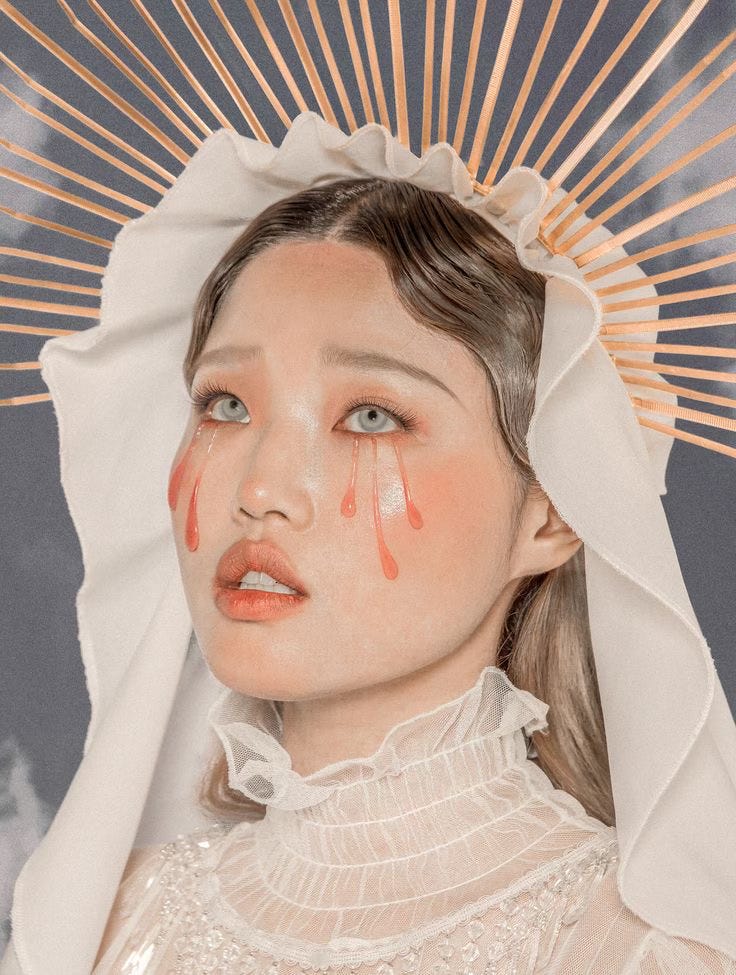It Could Always Be Worse
and still more about the mantra of 2023
C and I were recently discussing the events of this year and how both of us were unsure of how to see it, given that things could have always been worse. Yes, C had cancer with a high risk of death, but it could have been this kind of cancer or this other kind of cancer. He had terrible side effects from the chemotherapy, but at least he didn’t shit the bed in the hospital, which was something that the nurses had led him to believe was an inevitable outcome. He currently has graft vs. host syndrome, in which his body is confused by the foreign bone marrow and trying to fight it—but he has it primarily in his eyes and his skin, which is “the first draft pick” (his words) in terms of GVHD, which could be in so many other organs, to a much more terrible outcome.
As for me? This year, my small business struggled. I borrowed against credit cards and felt like I was drowning—the only person in our little family who was still working but somehow seemed to be losing rather than gaining money. A horrible breadwinner, in other words. Yet the Academy is still going. My beloved right-hand gal, Chloe, is leaving, but I have a new direction for it that will debut in this newsletter quite soon, and so it could be worse—because I could instead have no hope, and I could instead hurl myself into the nearest flaming garbage can. The new book is going slowly, but at least it is going, and my editor seems to like what she’s seen so far. I had a complex ovarian cyst, but it could be larger. I was fired by my psychiatrist, but I could have no health insurance.
It could be worse is not a tendency of ours. I don’t think it’s a tendency of mine. Yet in 2023, when so many things have assaulted us—our bodies, our spirits, our minds—I keep reminding myself that there is always something worse that could be happening, and if that thing were to happen, I would think with regret upon the easier days that I’d had before, when I merely had peripheral neuropathy blast my right arm and thumb, and chronic fatigue plagued me for hours before it let me go.
When I was still a student at Yale two decades ago, I point-blank asked my psychiatrist if there were any students diagnosed with schizophrenia. He didn’t answer my question, but I knew why I had asked it: I wanted to know if there were any students who were worse off than I was. Funnily enough, I’d be diagnosed with the schizophrenias a decade later. I’d become known as a writer who wrote about the schizophrenias in a book published by Graywolf Press. That girl who asked the psychiatrist about those other students so long ago might have been horrified to know that she’d one day be plagued by delusions and hallucinations, instead of simply manias and depression. At that moment in the psychiatrist’s office, hidden away in Yale’s Mental Hygiene department, she only wanted to know about the people who suffered worse than she did. (And she would.)
I write this while sitting at our dining room table. It’s a farm table that was the first piece of real furniture that we ever acquired—I’d always dreamt of a farm table, one that could host noisy dinner parties and small gatherings of friends. Now the table is home to assorted prescription bottles and potions. C’s bandana, which he wears on his chemo-induced hairless head. Two Humulin KwikPens for the injection of insulin for his steroid-induced diabetes, which I sometimes inject for him, and have done at least once incorrectly, much to my horror. A copy of Leslie Jamison’s The Empathy Exams (aff), which I read at the Hedgebrook residency; that book changed my life, as I believe it changed the lives of so many other people who thought an essay collection could never hit the New York Times bestseller list—and now I call Leslie a friend. The table is not surrounded by friends; it is not the home to platters of whole fish and fennel-avocado salad. Someday, maybe. But it could also be worse.
I started this Substack not long ago. I’ve been compelled to write a newsletter daily, which I’d never thought would be the case when I began the endeavor. But there are now paying subscribers—101, the last time I looked—and I am profoundly grateful to those people. I hope my words are worth it. I hope you find something of use in this assortment of letters as I try my best. I am always, always trying my best. I just wanted you to know.





The desire for others to believe and trust that you are truly truly trying so hard is very relatable. As is this constant comparison that leads to “this could be worse.” There are no (or should not be) any Pain Olympics -- there’s no medal on that podium. However, the saying as you’re relating to it is clearly a form of gratitude despite the suffering. I don’t think gratitude is ever a bad thing; it is hope filled.